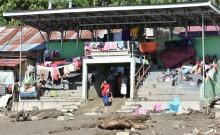
The Islamic State group — also known as Islamic State of Iraq and Syria (ISIS) or Islamic State of Iraq and the Levant (ISIL) — is believed to be staging a comeback to power of sorts in Iraq and Syria, first with capturing the historic city of Palmyra, and then it emerging that the quality of the weapons it is making at various places could rival those of top militaries in the world.
The report on weapons
According to a report published by London-based organisation Conflict Armament Research (CAR): "ISIS forces operate a 'Central Organisation for Standardisation and Quality Control' (COSQC), which falls under the authority of the group's 'Soldiers' Bureau, Committee for Military Development and Production.' The COSQC issues specific guidelines on weapon production parameters and controls manufacturing quality."
It adds: "ISIS forces adopt similar practices to national military forces, which distinguish the group from other groups that manufacture improvised weapons on an ad hoc basis. The production of factory-grade packaging is one example, whereby the group has constructed palletised wooden boxes for the long-term storage, and long-range transport, of rockets and mortar rounds."
The report also says that ISIS operates facilities that, though spread out, "are centrally coordinated, produce to pre-defined standards, and manufacture separate stages of weapon production." Even their production is robust, with the report claiming: "Within a six-day period, CAR investigators documented more than 5,000 rockets and mortar rounds in various stages of production. CAR also documented more than 500 finished mortar rounds, which Iraqi forces had recovered on the battlefield."
Taking of Palmyra
ISIS was believed to have been almost vanquished, what with it being cornered in Mosul and preparing to leave Anbar? However, the terrorist group re-entered the Syrian city of Palmyra nine months after having lost it. According to monitoring groups, there was a fierce battle between terrorists and pro-government forces, fuelling safety concerns for civilians still in the city.
Subsequently, the RIA news agency has quoted the Russian defence ministry as saying that the United States' decision to suspend active operations in Syria's Raqqa had allowed the ISIS militants to redeploy in Palmyra.
















